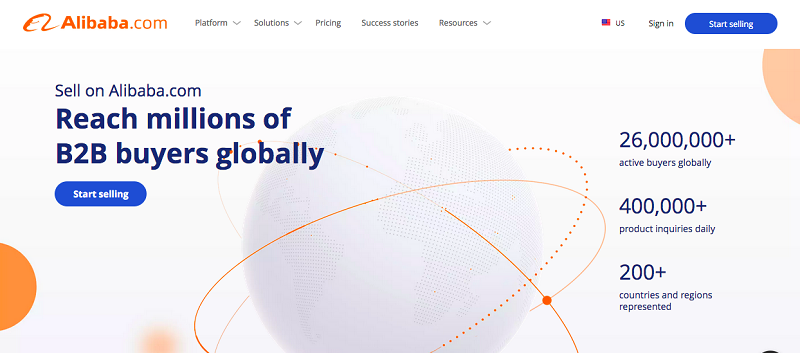Is it too late to start a business? A look at age in entrepreneurship

It seems that now more than ever is the golden age for startups. But when it comes to actual age, as in how old the founders of these startups are, it seems ostensibly like it is only young startup founders who are making strides in the business world.
In this article, we’ll look at the age tropes surrounding entrepreneurship, particularly exploring why young startup founders are mythologized and whether or not it is too late for those above a certain age bracket to start a business.
We’ll end with looking at how e-commerce and online marketplaces, such as Alibaba.com, have democratized commerce and made it easier for entrepreneurs of all ages to engage with buyers from all over the world to achieve business success, even when working with relatively few resources.
Table of Contents
- Is it too late to start a business? A look at age in entrepreneurship
- Is there a right age to start a business?
- The young entrepreneur trope
- Why age can be beneficial in business
- 4 strategies for quick-starting an online business
- The advantages of marketplaces for online selling
- Sell on Alibaba.com
Is there a right age to start a business?

An idea for a business is like an artistic muse, it can come to anyone, at any time. However, when it comes to business, an idea alone is not enough. There are other variables that entrepreneurs need to consider, including startup costs, capital and finance, market saturation, consumer demand, location and regulatory environment, knowledge or expertise, staff or available talent, and technology, among many others.
When considering these variables as a whole, it is easy to see that having a greater combination of these key factors is one of the strongest predictors of startup success, rather than age alone.
A young entrepreneur can enter into an unsaturated market where consumer demand is strong and there is a plethora of available talent to execute their vision and achieve business success. The same can happen for a 60-year-old startup founder who has amassed significant expertise in their business domain, giving them critical market knowledge that enables successful market penetration.
Long story short, there’s no hard and fast rule regarding age, however, being of a certain age during the different paths of the entrepreneurship journey make it easier to attain certain critical skills or resources. Let’s take a look at that further.
The young entrepreneur trope

It is no secret that young entrepreneurs have become mythologized in our collective culture, and Silicon Valley has been one of the key drivers of famous high-growth startups founded by young entrepreneurs.
The reason for this is because, indeed, young people have been early adopters of new technologies that have become groundbreaking in this new digital age. What newer, more efficient gold mining equipment was to ambitious miners during the California Gold Rush in the 1800s, is what digital is to young entrepreneurs right now.
Digital technologies have kick-started the careers of more than half of the world's richest people before they were even 20-year-olds or in their 30s. Mark Zuckerberg, who has become the poster child for the young entrepreneurs trope, founded Facebook at 19, Bill Gates founded Microsoft at 19, Sergey Brin and Larry Page founded Google at 25, Jeff Bezos founded Amazon at 30, Larry Ellison founded Oracle at 32, and Elon Musk founded Tesla at 32.[1]
We could go on, but it’s clear that the myth has been fueled by the astronomical success that a number of key entrepreneurs have had at an early age. But that’s not the whole story.
Why age can be beneficial in business

While the young entrepreneur trope is pervasive, in recent years, there have also been high-profile cases showing that age alone should not be a reason for venture capitalists to throw themselves at the next ‘revolutionary’ idea. Not everyone can replicate Zuckerberg’s early success — Adam Neumann of WeWork and Elizabeth Holmes of Theranos come to mind.
When looking at some of the top traits of successful startup founders, Forbes found that true domain expertise is one of the major prerequisites.[2] The successful startups have been those that found unique solutions to long-standing or new problems. Having insight and real experience in a particular field can give the startup founders an advantage. There are different paths to attaining knowledge or expertise, but one of the sure-fire ways is through years of immersion and experience in a certain domain.
The stories of Colonel Sanders who founded Kentucky Fried Chicken (KFC) in his 60s and Sam Walton who founded Walmart while middle-aged are evidence of this. Both men had acquired years of life experience and significant domain expertise in their younger years, so when they finally started their enterprises, they were armed with key market knowledge.
4 strategies for quick-starting an online business

E-commerce has made it easier for entrepreneurs across the board to be able to access markets where they previously could not. This has served to democratize business and made it so that it is not only startup founders in a certain locale who are able to find success.
Let’s explore some of the strategies you and your business can adopt when starting an online business.
1. Be bold and purposeful
Having a powerful reason for why you are in business can not only help you to stay focused as an entrepreneur, but it can also work as a compass for those that work for your company, as well as consumers looking to engage with you.
If everyone knows the “why” or the purpose behind your enterprise, then you have a higher chance of being able to rally people around the mission. Couple this with the courage to pursue that goal and you’ll be able to persevere even when times get hard.
2. Cultivate a niche
Being able to focus on a particular aspect of a customer’s needs can give your business a better chance of successfully solving a single problem and of gaining a sizable market share in that particular niche.
Successful businesses such as Facebook and Amazon started off as one thing (the former a social networking site and the latter as an online bookseller), and were able to initially stick with their core business, attain success in it, and then conquer other segments.
3. Consolidate your online presence
An integral part of starting an online business is building an online presence. Consumers want to have an easy and efficient way of finding and engaging with you, so set up a website with either Squarespace or Wix, as well as social media pages with constantly updated content. In other words, become a digital native.
4. Trade on a marketplace
Marketplaces have made it easier for relatively small startups to engage with buyers across the world with just the click of a button.
Because large marketplaces like Alibaba.com, Amazon, and eBay pull in millions of buyers, you have a better chance of reaching more customers than solely trading from your website.
The advantages of marketplaces for online selling
Here are some benefits that selling on an online marketplace can have for your e-commerce business.
- Cost-effective: Starting a new venture often entails significant startup costs, including website development and management, customer acquisition, and marketing. Marketplaces enable you to set up an online storefront that is listed in your category, allowing you to set up your online presence at a relatively lower cost.
- Reach local and overseas buyers: Traditional brick and mortar stores depend on foot traffic to be successful, whereas e-commerce stores depend on online traffic. Because marketplaces pull in millions of buyers, you are able to reach millions of customers across the globe almost instantly.
- No need for previous online sales experience: The available templates and guides enable you to set up your store and run it with relative ease. Marketplaces such as Alibaba.com make it easier for you to list your products, select categories, and set up shipping and delivery for your business.
Sell on Alibaba.com

Starting a successful company is not easy, but as we’ve shown, regardless of what age you are, you can adopt certain strategies, tools, and resources to give yourself a better chance of achieving business success.
Being one of the world’s largest B2B and B2C marketplaces, Alibaba.com has been able to create a platform that makes it easier for entrepreneurs to set up their online store and connect with buyers globally.
Alibaba.com enables business owners to set up their customized storefronts and alongside this, it provides essential advertising tools, key data and analytics, as well as customer support. All these resources smoothen the onboarding process for new entrepreneurs and make it easier for you to run your e-commerce business. Find out more about this here.
It doesn’t end there either, as Alibaba.com ensures that sellers are provided with a number of market resources that include industry reports and seller guides. These resources give entrepreneurs the necessary market knowledge in terms of market size, customer demand, performance, and trends in their product area, equipping them to be able to better serve their customers.
It’s true, age is nothing but a number, so it’s never too late to start a business and achieve entrepreneurial success. All you need is to be bold and purposeful, cultivate a niche, consolidate your online presence, and start trading on an online marketplace. Start selling on Alibaba.com today!
References:
1. https://www.investopedia.com/articles/investing/012715/5-richest-people-world.asp
2. https://www.forbes.com/sites/forbesfinancecouncil/2021/05/13/the-top-five-traits-of-successful-startup-founders/?sh=3dd404e92546
Start your borderless business here
Tell us about your business and stay connected.
Keep up with the latest from Alibaba.com?
Subscribe to us, get free e-commerce tips, inspiration, and resources delivered directly to your inbox.














